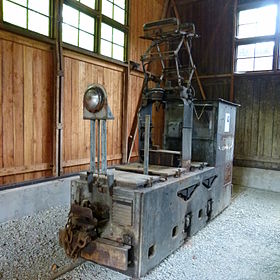LEW EL 11
| Mine locomotive for contact wire operation EL 11 | |
|---|---|
|
EL 11 locomotive 10730 formerly potash and rock salt works Bartensleben
in the exhibition of the historical light railway Dresden
|
|
| Number: | 54 |
| Manufacturer: | LEW |
| Year of construction (s): | 1953-1965 |
| Axis formula : | Bo |
| Type : | Contact wire locomotive |
| Genre : | Mine locomotive |
| Gauge : | 480-600 mm |
| Length over buffers: | 3610 mm |
| Height: | 1400 mm |
| Width: | 900 mm |
| Fixed wheelbase: | 800 mm |
| Service mass: | 5 t |
| Top speed: | 15 km / h |
| Continuous output : | 24 kW |
| Starting tractive effort: | 12.7 kN |
| Driving wheel diameter: | 600 mm |
| Power system : | 220 or 550 V = |
| Power transmission: | Overhead line |
| Number of traction motors: | 2 |
| Type of speed switch: | Cam switch |
| Brake: | el. drag brake |
The EL 11 series of VEB LEW Hennigsdorf is the name of an electric locomotive that was built from 1953 to 1965 in 54 copies. Only one locomotive was exported to Romania.
development
The EL 11 was the smallest catenary locomotive of the LEW and a niche product. It was specially developed for underground operation in pits with small route profiles. The main customers were the iron ore mines, copper mines and hard coal works. When the production in these pits was discontinued, the locomotive became superfluous. It was used in pieces:
- Mansfeld
- 6 Mansfeld Kombinat Eisleben
- 6 VEB Kupferbergbau Otto Brosowski
- 4 Mansfeld Hüttenkombinat Wilhelm Piek
- 2 Karl Liebknecht Hut Eisleben
- Iron ore mining
- 6 VEB Harzer Eisengruben department Büchenberg
- 3 VEB Harzer Eisengruben Department Hüttenrode
- 2 VEB Eisenerzgruben Saalfeld
- 1 VEB Eisenerzgrube Wittmansgereuth
- 1 VEB Schwefelkiesgrube Elbingerode
- Hard coal
- 4 VEB Steinkohlenwerk Karl Marx Zwickau
- 5 VEB Steinkohlenwerk Plötz
- Salt mining
- 1 Bartensleben potash and rock salt works
- Stone and earth operations
- 7 VEB Sand- u. Tonwerke Walbeck
- 4 VEB Kemmlitzer Kaolinwerke
- 1 VEB Vereinigte Hartsteinwerke Hohnstädt-Grimma
Two copies have been preserved in a heavily rebuilt condition.
Constructive features
mechanics
The frame of the locomotive was made of welded heavy plate . The frame was supported by leaf springs . The locomotives were made in different gauges. So far, examples with 500 mm and 600 mm track width are known. The locomotive has a terminal cab. In addition to the electrical resistance brake, it had a hand spindle brake as a parking brake. The pantograph was attached to the cab roof. The contact wire height was 2000-2500 mm, in exceptional cases up to 1600 mm. The cab was raised for use above ground and the pantograph was attached to a frame on the front of the locomotive.
Electrics
Each axle was driven by a drive motor in the cradle bearing . With the cam travel switch, 9 series speed levels, 5 parallel travel levels and 9 braking levels can be selected for the direct current series motors via a resistance control.
literature
- Holger Neumann, Sven Kästner: Narrow-gauge industrial locomotives of the GDR . Herdam, Gernrode 2008, ISBN 978-3-933178-22-0 .
- Jürgen Becker, Peter Garbe: Rail vehicles from Hennigsdorf near Berlin . tape II . Neddermeyer, Berlin 2006, ISBN 3-933254-72-8 .
Individual evidence
- ^ Electric locomotive LEW EL September 11 , 2000, accessed on March 5, 2015 .
- ↑ a b Jens Merte: Locomotives LEW preserved in a museum . Retrieved March 5, 2015 .
